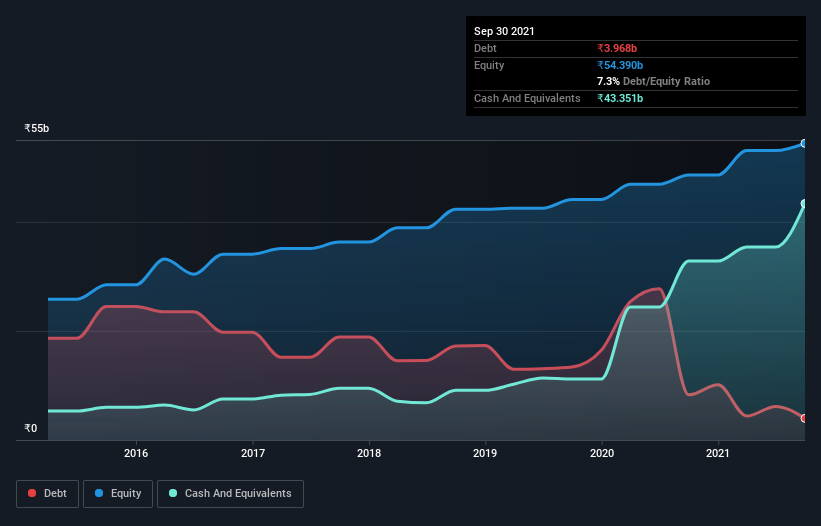- India
- /
- Electronic Equipment and Components
- /
- NSEI:REDINGTON
Is Redington (India) (NSE:REDINGTON) A Risky Investment?

The external fund manager backed by Berkshire Hathaway's Charlie Munger, Li Lu, makes no bones about it when he says 'The biggest investment risk is not the volatility of prices, but whether you will suffer a permanent loss of capital.' When we think about how risky a company is, we always like to look at its use of debt, since debt overload can lead to ruin. We note that Redington (India) Limited (NSE:REDINGTON) does have debt on its balance sheet. But the real question is whether this debt is making the company risky.
Why Does Debt Bring Risk?
Generally speaking, debt only becomes a real problem when a company can't easily pay it off, either by raising capital or with its own cash flow. Part and parcel of capitalism is the process of 'creative destruction' where failed businesses are mercilessly liquidated by their bankers. However, a more frequent (but still costly) occurrence is where a company must issue shares at bargain-basement prices, permanently diluting shareholders, just to shore up its balance sheet. Of course, plenty of companies use debt to fund growth, without any negative consequences. When we think about a company's use of debt, we first look at cash and debt together.
View our latest analysis for Redington (India)
What Is Redington (India)'s Debt?
You can click the graphic below for the historical numbers, but it shows that Redington (India) had ₹3.97b of debt in September 2021, down from ₹8.28b, one year before. However, its balance sheet shows it holds ₹43.4b in cash, so it actually has ₹39.4b net cash.

How Healthy Is Redington (India)'s Balance Sheet?
According to the last reported balance sheet, Redington (India) had liabilities of ₹101.1b due within 12 months, and liabilities of ₹2.76b due beyond 12 months. Offsetting these obligations, it had cash of ₹43.4b as well as receivables valued at ₹72.1b due within 12 months. So it actually has ₹11.5b more liquid assets than total liabilities.
This surplus suggests that Redington (India) has a conservative balance sheet, and could probably eliminate its debt without much difficulty. Succinctly put, Redington (India) boasts net cash, so it's fair to say it does not have a heavy debt load!
On top of that, Redington (India) grew its EBIT by 64% over the last twelve months, and that growth will make it easier to handle its debt. The balance sheet is clearly the area to focus on when you are analysing debt. But ultimately the future profitability of the business will decide if Redington (India) can strengthen its balance sheet over time. So if you're focused on the future you can check out this free report showing analyst profit forecasts.
Finally, a business needs free cash flow to pay off debt; accounting profits just don't cut it. While Redington (India) has net cash on its balance sheet, it's still worth taking a look at its ability to convert earnings before interest and tax (EBIT) to free cash flow, to help us understand how quickly it is building (or eroding) that cash balance. Happily for any shareholders, Redington (India) actually produced more free cash flow than EBIT over the last three years. That sort of strong cash conversion gets us as excited as the crowd when the beat drops at a Daft Punk concert.
Summing up
While we empathize with investors who find debt concerning, you should keep in mind that Redington (India) has net cash of ₹39.4b, as well as more liquid assets than liabilities. The cherry on top was that in converted 179% of that EBIT to free cash flow, bringing in ₹21b. So we don't think Redington (India)'s use of debt is risky. The balance sheet is clearly the area to focus on when you are analysing debt. But ultimately, every company can contain risks that exist outside of the balance sheet. Be aware that Redington (India) is showing 1 warning sign in our investment analysis , you should know about...
Of course, if you're the type of investor who prefers buying stocks without the burden of debt, then don't hesitate to discover our exclusive list of net cash growth stocks, today.
New: AI Stock Screener & Alerts
Our new AI Stock Screener scans the market every day to uncover opportunities.
• Dividend Powerhouses (3%+ Yield)
• Undervalued Small Caps with Insider Buying
• High growth Tech and AI Companies
Or build your own from over 50 metrics.
Have feedback on this article? Concerned about the content? Get in touch with us directly. Alternatively, email editorial-team (at) simplywallst.com.
This article by Simply Wall St is general in nature. We provide commentary based on historical data and analyst forecasts only using an unbiased methodology and our articles are not intended to be financial advice. It does not constitute a recommendation to buy or sell any stock, and does not take account of your objectives, or your financial situation. We aim to bring you long-term focused analysis driven by fundamental data. Note that our analysis may not factor in the latest price-sensitive company announcements or qualitative material. Simply Wall St has no position in any stocks mentioned.
About NSEI:REDINGTON
Flawless balance sheet established dividend payer.
Similar Companies
Market Insights
Community Narratives




